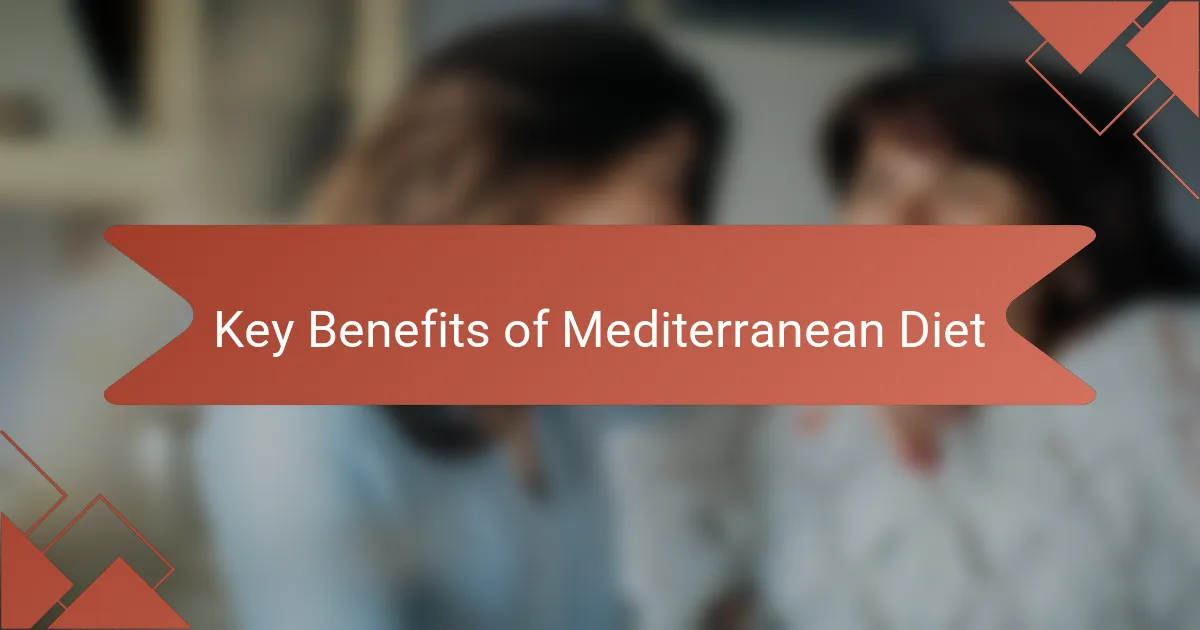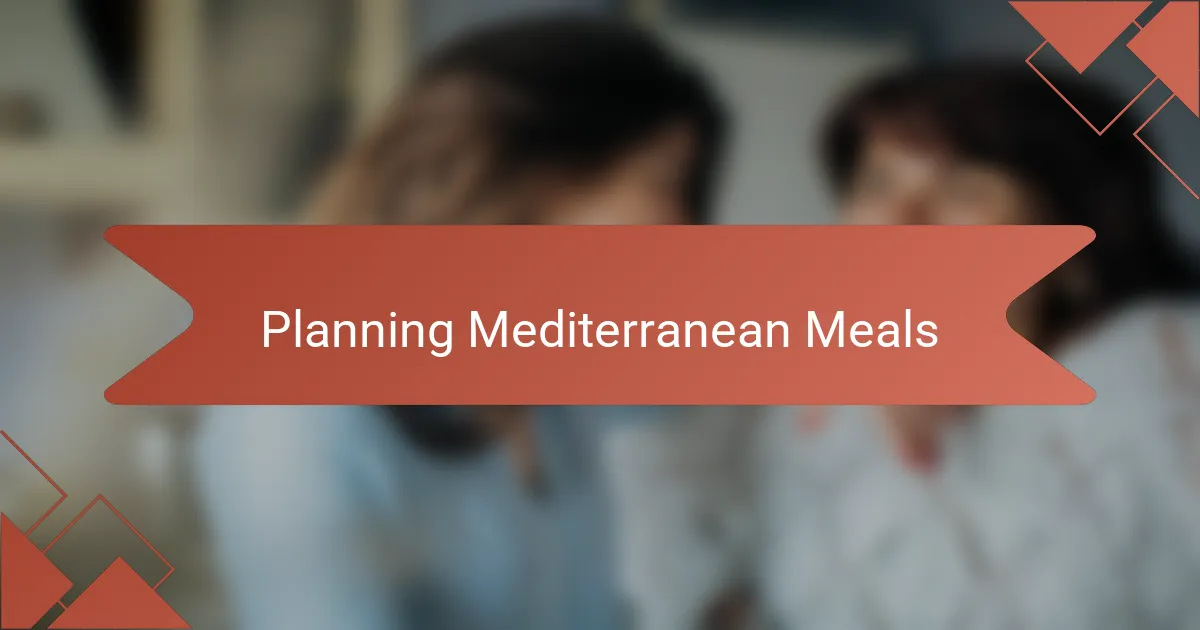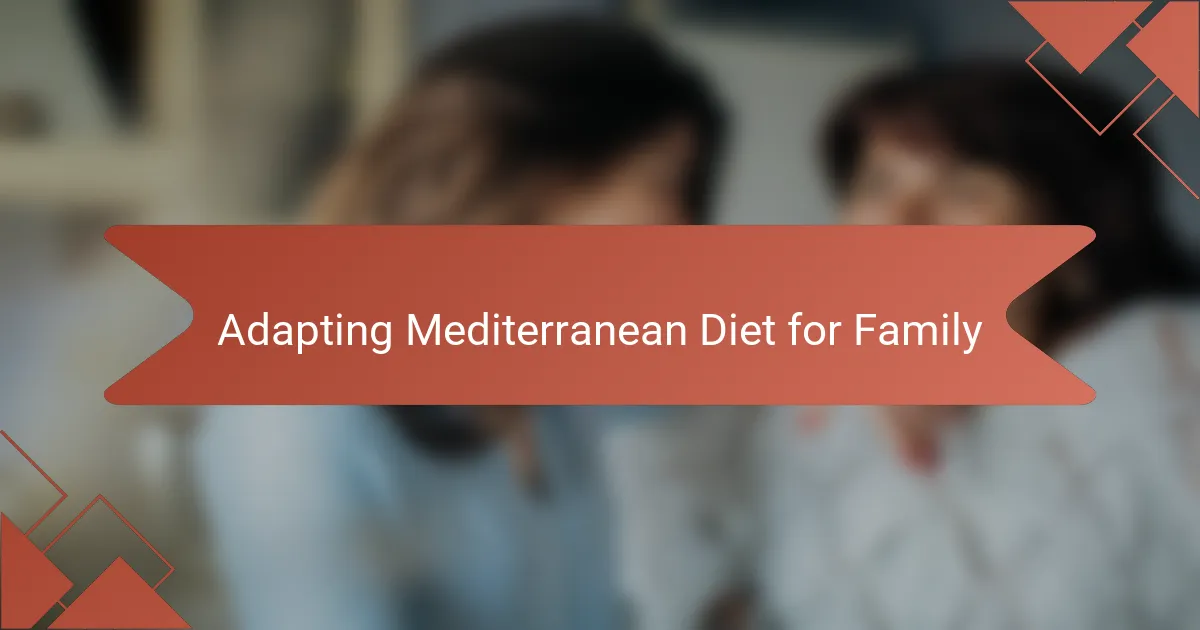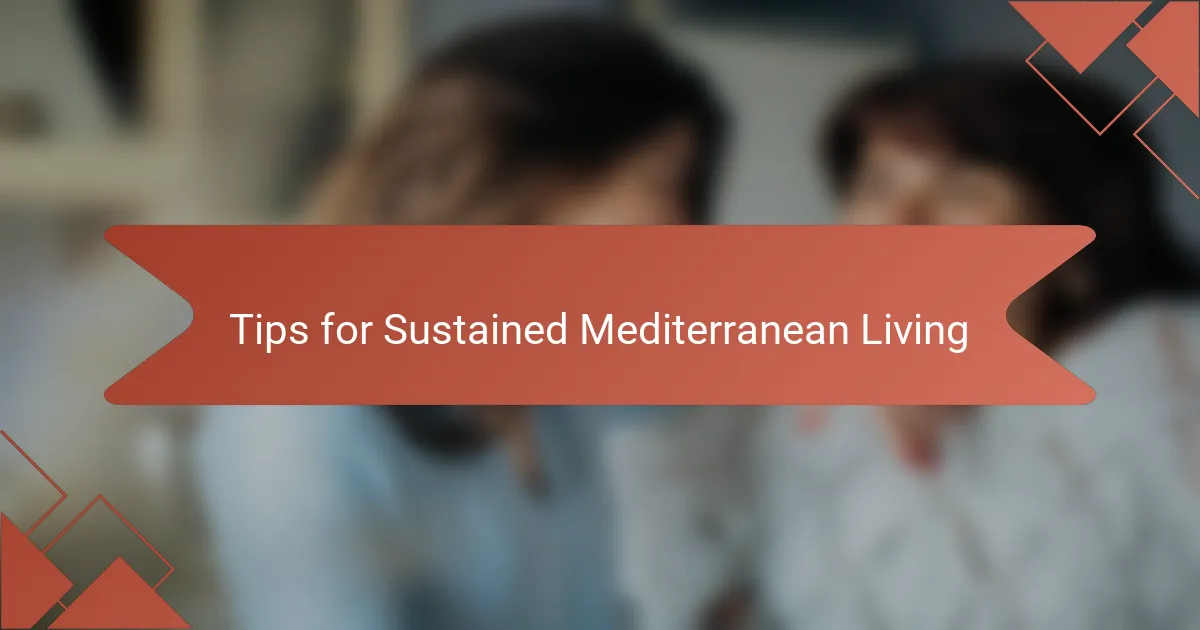Key takeaways
- The Mediterranean Diet emphasizes fresh, whole ingredients and encourages enjoying meals in a social setting, fostering connections with family.
- It supports heart health, boosts energy and mood, and has natural anti-inflammatory properties due to its focus on antioxidants and healthy fats.
- Planning meals with seasonal produce and core staples like olive oil and whole grains makes healthy eating flexible, enjoyable, and accessible.
- Involving family in meal preparation and adapting recipes to suit their tastes can enhance engagement and make healthy eating a shared experience.

What is Mediterranean Diet
The Mediterranean Diet is more than just a list of foods; it’s a way of eating inspired by the traditional cuisines of countries bordering the Mediterranean Sea. It emphasizes whole, fresh ingredients like fruits, vegetables, whole grains, nuts, olive oil, and lean proteins such as fish.
When I first learned about this diet, I was struck by how simple yet flavorful the meals are. Have you ever noticed how a drizzle of good olive oil or a handful of fresh herbs can transform a dish? That’s the beauty of the Mediterranean Diet—it focuses on quality and balance rather than strict rules.
What really drew me in was the lifestyle aspect behind the diet. It’s about enjoying meals with family, savoring every bite, and appreciating the social connection food brings. This made me wonder: could changing how we eat also help us reconnect with our loved ones?

Key Benefits of Mediterranean Diet
What I found most surprising about the Mediterranean Diet is how effortlessly it supports heart health. Research shows it can lower bad cholesterol and reduce the risk of heart disease, which made me realize that eating well doesn’t have to be complicated. Have you ever thought that a simple shift in what you put on your plate could protect your heart in the long run?
Another benefit I experienced firsthand is the boost in energy and mood. After a few weeks of embracing fresh veggies, nuts, and olive oil, I noticed I felt lighter and more vibrant throughout the day. It made me question: why had I not prioritized these wholesome foods before, when they clearly made such a difference?
Finally, the Mediterranean Diet’s natural anti-inflammatory properties stood out to me. Chronic inflammation is linked to many health problems, but this way of eating, rich in antioxidants and healthy fats, seemed to soothe my body in subtle ways. Isn’t it incredible how food can heal beyond just filling us up?

Essential Mediterranean Foods
When I first started exploring the Mediterranean Diet, I quickly realized that certain foods were absolutely essential. Olive oil, for instance, isn’t just a cooking ingredient but the heart of the diet—it adds richness without heaviness and brings a beautiful depth of flavor. Have you ever tasted a simple salad dressed with freshly pressed olive oil? It’s like a little celebration in every bite.
Vegetables, especially leafy greens and colorful peppers, became my daily companions. Their freshness and crunch made meals feel vibrant and alive, far from the dull and boring meals I used to eat. And then there are nuts—almonds and walnuts—not only did they satisfy my snack cravings, but they also added that needed boost of protein and healthy fats.
Seafood surprised me the most. Including fish like salmon and sardines felt indulgent yet so natural here, and I noticed how my body responded positively with more energy and less sluggishness. What’s fascinating is how these essential foods don’t just nourish you—they invite you to slow down and truly enjoy eating. Isn’t that a simple but powerful way to connect with both food and family?

Planning Mediterranean Meals
Planning Mediterranean meals felt like an exciting puzzle at first. I found that focusing on seasonal vegetables and fresh herbs not only made grocery shopping easier but also kept each meal interesting. Have you ever discovered how just picking up a handful of sun-ripened tomatoes or a bunch of basil can spark your creativity in the kitchen?
What surprised me was how flexible the meal plans became with a few core staples—olive oil, whole grains, and legumes. I often cooked a big batch of quinoa or lentils early in the week, then mixed in different veggies and fish to keep things fresh. It was comforting to know that healthy, flavorful meals didn’t demand hours of prep or exotic ingredients.
One thing I learned quickly is that balancing flavors mattered just as much as choosing the right foods. A squeeze of lemon here, a sprinkle of feta there—it transformed simple dishes into something special. Have you noticed how small touches can make your family mealtime feel warmer and more inviting? That gentle attention to detail made planning Mediterranean meals a joyful habit rather than a chore.

Adapting Mediterranean Diet for Family
Adapting the Mediterranean Diet for my family meant finding ways to bring everyone together around the table without feeling like a chore. I quickly realized that introducing new flavors works best when you mix familiar favorites with fresh ingredients. Who wouldn’t be more open to trying a new veggie when it’s paired with something they already love?
I also learned to involve my kids in meal prep, which made the whole experience more fun and less intimidating. Watching them toss olives onto a salad or sprinkle herbs felt like small victories—moments where healthy eating became a shared adventure rather than a forced rule. Have you ever noticed how family involvement can turn picky eaters into curious food explorers?
Of course, flexibility was key. Some nights called for a Mediterranean-inspired pasta, while others were heavy on grilled fish and roasted vegetables. It wasn’t about perfect adherence but about making balanced choices that fit our busy lives. Do you think a diet works better when it adapts to your family’s rhythm instead of the other way around? I certainly found that to be true.

Challenges Faced During Experiment
One challenge I quickly encountered was the sudden abundance of fresh vegetables and herbs. At first, I underestimated the prep time involved—washing, chopping, and storing all these vibrant ingredients felt overwhelming. Have you ever started something with excitement only to find out that the behind-the-scenes work takes much more effort than expected? That was definitely me in the early days.
Another hurdle was adjusting my family’s taste buds. Introducing new flavors like briny olives or tangy feta wasn’t always met with enthusiasm around the dinner table. It’s funny how the familiar comforts we grow up with cling so tightly, making experimentation feel like a subtle battle. Yet, I learned that patience and small, gradual changes made all the difference over time.
Finally, sticking to the Mediterranean Diet during busy weeks wasn’t as straightforward as I’d hoped. There were moments when convenience tempted me to stray, especially when fresh ingredients weren’t readily available. I found myself asking: how can I keep this lifestyle sustainable without turning it into another stressful obligation? Finding that balance became an ongoing personal experiment in itself.

Tips for Sustained Mediterranean Living
Sticking with the Mediterranean lifestyle felt easier when I embraced flexibility. Instead of aiming for perfection, I allowed myself room to swap ingredients or simplify recipes when life got hectic. Have you ever noticed how a little adaptability takes the pressure off and actually helps you keep long-term habits going?
Another tip that really worked for me was making meals a social experience. Sitting down with family or friends and savoring food together turned eating into a cherished ritual, not just a task. Isn’t it amazing how sharing food can deepen connections and make healthy eating something to look forward to?
Lastly, I found that keeping a stocked pantry of Mediterranean essentials — olive oil, canned tomatoes, nuts — became my safety net. This way, even on days when fresh produce was scarce, I could still whip up something nutritious and tasty without stress. Have you tried prepping your kitchen like this? It honestly saved me on many busy evenings.